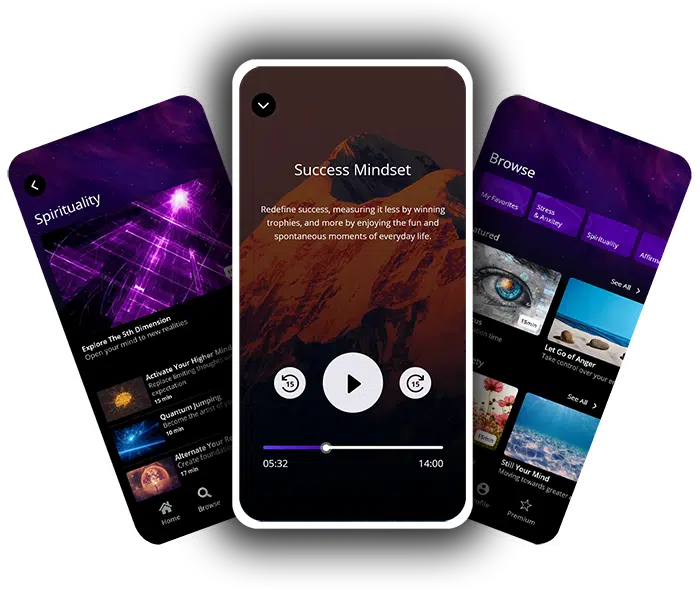Imagine this: your heart starts racing, palms get sweaty, and then a sharp tug at your chest makes you pause. It’s a scary moment when you wonder if stress is just playing tricks on your body or if something more serious is going on.
Can the pressure of everyday life really cause physical pain in your chest?.
The answer might surprise you – yes, stress can manifest as very real physical symptoms, including chest pain. When our minds are burdened with worry and tension, it’s not uncommon for our bodies to respond in kind.
Often mistaken for signs of a heart attack, these pains can be unnerving but usually aren’t indicative of an immediate medical crisis.
In today’s post, we’re diving into the nitty-gritty of how to recognize if anxiety is knocking on your ribs—and what exactly to do about it right away. Get ready to learn five actionable steps that could ease your mind and soothe that pesky chest discomfort whenever stress tries to tighten its grip.
Keep reading because understanding this connection could bring much-needed relief!

Unleash Your True Potential!
Explore the world of meditation with our powerful guided sessions crafted to bring peace and strength to your spirit.
But first, let’s ensure our sessions are the perfect fit for you.
Take our short quiz to find out!
Table of contents
Can Stress Cause Chest Pain?
Stress is a common trigger for chest pain, often due to the physical and emotional impact it can have on the body. Understanding how stress can manifest as chest pain is important in managing this symptom effectively.
Understanding stress
Stress is like a tight feeling in your body and mind. It’s what you feel when you’re worried or have too much to handle. Human bodies react to stress by releasing stress hormones, which can speed up our heart rate and raise our blood pressure.
This is part of the fight-or-flight response, helping us deal with danger or run away fast.
High levels of these stress hormones over time may lead to health issues including panic attacks and heart problems. Stress can also cause many other symptoms like chest pain, tiredness, bad sleep, headaches, dizziness, and shaking.
Now let’s explore how this stress might make your chest hurt.
How stress can cause chest pain
Feeling stressed can squeeze your heart and make you feel chest pain. Your brain sends out stress hormones. For example, cortisol when you’re anxious or upset. These hormones prepare your body to face a challenge, but they also tighten up blood vessels and make your heart beat faster.
This can lead to what some call “stress cardiomyopathy” which looks a lot like a heart attack with chest pain and difficulty breathing.
The tight feeling in the chest that comes from panic attacks can stick around for days. It’s important to learn how to calm this kind of pain because it’s not good for your heart or mind.
Next, let’s talk about knowing if stress is causing this pain or if it’s really signs of something serious with the heart.
Differentiating Stress Chest Pain from Cardiac Issues
Recognizing the symptoms and location of pain, as well as patterns of pain, can help distinguish stress-induced chest pain from cardiac-related issues. It’s crucial to understand these differences for prompt and appropriate action.
Symptoms and location of pain
Chest pain from stress often feels different than pain from heart issues. It might show up as a sharp pain, a dull ache, or even a feeling that’s crushing or burning. This kind of chest pain can hit you anywhere in your chest.
But it’s not only about the pain – feelings like fear, trouble breathing, and sweating can also come with it.
Pain patterns are important too. Stress-related chest pain might last for just a short time or come and go over days. Unlike heart attack pains that often spread to other parts of the body like arms or shoulders, stress-induced pains usually stay put in one spot.
Plus, they may get worse when you’re dealing with more worry or emotional troubles but tend to ease when you relax.
Patterns of pain
Chest pain caused by stress or anxiety may feel sharp, unlike the squeezing or heavy pressure of a heart attack. It can mimic symptoms and changes in the heart’s electrical activity similar to those of a heart attack.
Noncardiac chest pain associated with stress can be linked to psychological symptoms like anxiety and depression, requiring attention and care.
Recognizing these distinct patterns of pain helps in understanding and addressing stress-induced chest discomfort promptly. Stress-related chest pain serves as a reminder to prioritize emotional well-being while seeking appropriate support and strategies for managing stress effectively.
5 Immediate Actions for Dealing with Stress-Induced Chest Pain
There are a few things you can do immidiately. For example, practice relaxation techniques such as meditation or take deep breaths can help alleviate chest pain caused by stress. You must also prioritizing physical health, checking for emotional distress, and practicing mindful eating are other effective ways to manage stress-induced chest pain.
Practicing deep breathing

Unleash Your True Potential!
Explore the world of meditation with our powerful guided sessions crafted to bring peace and strength to your spirit.
But first, let’s ensure our sessions are the perfect fit for you.
Take our short quiz to find out!
When dealing with stress-induced chest pain, practicing deep breathing can be a ver powerful tool to calm the body and mind. Deep, diaphragmatic breathing helps reduce the stress response and symptoms of anxiety, including chest pain.
This simple yet effective practice that can be done anywhere and takes just a few minutes. By focusing on steady, deep breaths, individuals can prevent symptoms of anxiety from worsening and regain a sense of control over their physical and emotional well-being.
Remember that deep breathing is not only beneficial for immediate relief. However, it also plays a vital role in long-term stress management. It’s important to prioritize regular practice as part of your daily self-care routine for maintaining overall mental and emotional health effectively.
Using relaxation techniques, such as visualization or using a meditation app
Relaxation techniques like visualization and meditation apps are powerful tools for reducing stress in your everyday life. Research has shown that these methods can effectively alleviate stress and anxiety, promoting a sense of calm and well-being.
Meditation, whether focusing on breath, mantra, or imagery, is a simple yet impactful way to combat the effects of stress. By incorporating deep breathing and relaxation exercises into your routine, you can continue to imrove your ability to manage and reduce stress levels.
These practices empower individuals seeking personal growth and spirituality with accessible tools to navigate life’s challenges with resilience.
Prioritizing physical health
Now, let’s focus on prioritizing physical health. It’s important to understand that stress and anxiety can lead to unhealthy behaviors. For example, overeating or no physical activity. It can increase risk of heart disease and stroke.
Taking care of your body and doing regular exercise, nutritious eating habits, and sufficient sleep can help reduce impact of stress on your overall wellness.
Physical activities such as yoga or walking in nature not only contribute to better cardiovascular health but also have a calming effect on the mind. Engaging in these activities regularly helps manage stress levels effectively while promoting a healthier lifestyle.
Additionally, practicing mindfulness during meal times by paying attention to what you eat and how it makes you feel can significantly improve both your physical and mental well-being.
Check if anything is causing emotional distress
Emotional distress can trigger chest pain due to anxiety. Symptoms of emotional distress may include musculoskeletal chest pain linked to anxiety. Identifying and addressing emotional stressors is crucial for managing stress-induced chest pain effectively.
This process involves self-reflection and recognizing potential sources of emotional turmoil, such as work-related stress, relationship issues, or unresolved personal concerns.
Engaging in practices that promote spiritual well-being and personal growth can also help in identifying and alleviating emotional distress. Techniques like meditation, mindfulness, and introspection can aid individuals in understanding their emotions better while fostering a sense of inner peace.
Pay attention to your eating habits and start practicing mindful eating
Start paying close attention to the way you eat and practice mindful eating. Mindful eating encourages deep, intentional breathing as well as making thoughtful food choices. It involves focusing on your meal and chewing slowly.
This practice can counteract stress by promoting thoughtful food choices, reducing overeating, and helping to mitigate the stress response.
Stress is often linked with unhealthy behaviors like overeating, reduced exercise, and inadequate sleep which can worsen overall health. By incorporating mindful eating practices into daily life, it is possible to combat these negative effects of stress and promote both physical and emotional well-being.
When to Seek Medical Help for Chest Pain
If you experience chest pain that is severe, prolonged, or accompanied by other symptoms. For example, dizziness, shortness of breath, or nausea, seek medical help immediately. It’s crucial not to ignore potential signs of a serious cardiac issue and to receive prompt evaluation from a healthcare professional.
Identifying potential red flags
When experiencing chest pain, especially if it’s combined with shortness of breath, weakness, or changes in skin color, it might indicate a serious issue and needs immediate medical attention.
If you notice increasing physical symptoms along with fatigue, guilt, helplessness, or avoidance of family and social activities due to emotional distress, it’s important to seek professional help promptly.
These warning signs can be crucial indicators of an underlying health problem that requires attention.
Seeking prompt medical attention
If you experience a sudden and severe chest pain, especially if it also spreads to your arms, jaw, or back, it’s crucial to seek immediate medical help. Chest pain can be a serious indication of cardiac or respiratory issues that require prompt attention.
Signs such as persistent discomfort in the chest that doesn’t go away or severe pain radiating to other parts of the body should not be ignored. Remember, sudden chest pain is a reason to seek urgent medical care.
As we continue exploring the management strategies for stress-induced chest pain, understanding when to seek emergency help is crucial for safeguarding your health.
Conclusion
In conclusion, stress can indeed cause chest pain. This can be due to the release of adrenaline and cortisol in the body, often leading to anxiety and panic attacks. It’s important to differentiate between stress-induced chest pain and cardiac issues by seeking medical attention if symptoms persist or worsen.
Engaging in relaxation techniques, prioritizing physical health, addressing emotional distress, being mindful of eating habits, and practicing deep breathing are immediate actions that can help alleviate stress-induced chest pain effectively.
Seeking prompt medical help is essential if one experiences potential red flags or persistent chest discomfort.
FAQs
- Can stress really cause chest pain?
Yes, stress can cause chest pain. It’s often linked to anxiety disorders like panic disorder and generalized anxiety disorder. The pain might feel like a heart attack, but it can be a result of stress or an anxiety attack.
- What does stress-related chest pain feel like?
Stress-related chest pain can be sharp or dull and may feel similar to heart attack symptoms. You could also have a coronary artery spasm from severe anxiety that causes this type of chest pain.
- If I get chest pains during stress, what should I do first?
If you have sudden chest pains, go to the emergency room right away to make sure it’s not a heart attack or another serious condition affecting your heart muscle.
- Are there ways to treat my panic disorder that causes my chest pains?
Yes, treatments for panic disorders that lead to chest pains include medications such as benzodiazepines and SSRIs (selective serotonin reuptake inhibitors), therapy options like cognitive behavioral therapy (CBT), or even counseling sessions with trained mental health professionals.
- How do doctors know if my chest pain is from stress and not something more serious?
Doctors will check your signs and might use tests like an echocardiogram to see if your heart is okay. They’ll consider non-cardiac causes too if they find no sign of coronary disease through these checks.
- What are some ways I can prevent stress-induced chest pain in the future?
To prevent further episodes, work on managing your mental health by practicing relaxation techniques, engaging in physical activity regularly, getting enough sleep, using prescribed medication appropriately if needed for treatment of panic disorder or related conditions, and seeking support through talking therapies with licensed therapists.










